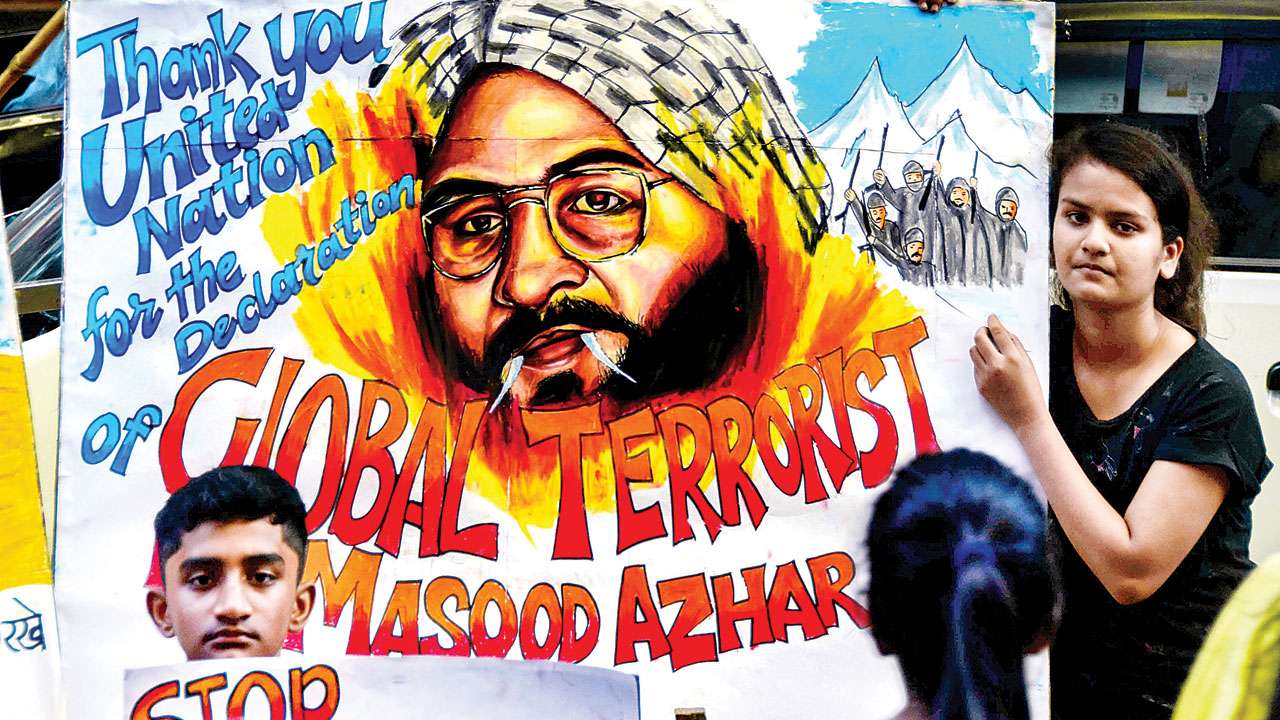
Masood Azhar, head of the Pakistan-based Jaish-e-Mohammad (JeM), was designated a ‘global terrorist’ by the UN Security Council 1267 Sanction Committee on May 1, 2019.
This is a major political, security and diplomatic victory for India. This listing makes all UN member states compulsorily freeze all assets, ban travel and place an arms embargo on Masood Azhar.
Ironically, a number of commentators, including some senior security analysts, have been discounting this achievement.
In their support, they cite the example of Hafiz Saeed, head of Lashkar-e-Toiba (LeT), who was also designated as a global terrorist by the UN Security Council in December, 2008, but remains a free man in Pakistan.
The UNSC’s limitations in monitoring its sanctions have rendered Saeed’s listing as symbolic, according to them.
The logical question that arises is — if such a listing by the UNSC is no big deal, then why did China and Pakistan fight tooth and nail to prevent Azhar from being listed as a global terrorist since back in 2009?
The fact is that as recently as February 15, 2019, when the Pulwama attack had already taken place, China had rejected India’s call to have Azhar put on the UN terror list.
“The 1267 Committee of the Security Council has a clear stipulation on the listing and procedure of terrorist organisations,” Chinese foreign ministry spokesman Geng Shuang said on February 15, adding, “China will continue to handle the relevant sanctions issue in a constructive and responsible manner”.
Wang Dehua, head of the Institute for South and Central Asia Studies at the Shanghai Municipal Centre for International Studies, was blunter. “It is useless to blame China for obstructing,” he said, arguing that UNSC resolution 1267 was drawn up specifically to target individuals with links to Al-Qaeda and Islamic State. “No matter the nature of the JeM, there is no evidence that its leader Masood Azhar is subordinate to Al-Qaeda and IS. Therefore, the JeM is not subject to resolution 1267, which specifically names the two organisations.”
Following this logic, the Chinese put a technical hold on March 13, 2019 when France, the UK and the USA initiated a proposal for naming Azhar to the UN Sanctions list after JeM took responsibility for the terror attack in Pulwama.
That these arguments are completely specious is evident from the fact that the 1267 Sanctions Committee had placed JeM itself on the sanctions list in October 2001 and its linkages with the Al-Qaeda had been proven beyond doubt.
Even at that time, Azhar was the leader of the JeM. In fact, Azhar should have been listed as a global terrorist at that time itself, but India missed an opportunity to do so.
It may be recalled that soon after the Mumbai terror attacks on November 26, 2008, India had moved a proposal for declaring Azhar a global terrorist. This attempt failed due to Chinese opposition in 2009.
Again in 2016, after the attack on the Pathankot Air Base, India attempted to have him listed, but China came in the way.
In 2017, yet again, a similar motion was moved, but China, citing insufficient proof against Azhar, blocked the proposal from being adopted.
It was only when the concerted move by the US, UK and France to shift the issue to the main Security Council from the 1267 Committee was mooted that China blinked. This is because while the Sanctions Committee functions in an opaque manner and its deliberations are not public, the Security Council operates in a glare of publicity.
The US had circulated a draft resolution in the UNSC to ban Azhar. The draft, which was backed by France and the UK, discussed China’s double standards on terrorism by mentioning the atrocities on Uighurs in Xinjiang.
If the US draft had been tabled in the Security Council, China would have to publicly justify its decade-long campaign to block attempts to designate Azhar as a global terrorist.
The fear that China would be exposed — and be the only SC member amongst 15 to oppose this move — led to Beijing seeking a face-saving way out.
It strongly protested against shifting of this issue from the Sanctions Committee to the main Security Council. The visit of India’s foreign secretary to China on April 21-22 and his presenting a detailed dossier on the terrorist activities of Azhar, ostensibly allowed the Chinese to claim that in view of new evidence, it was withdrawing its technical hold in the 1267 Sanctions committee, thus paving the way for Azhar to be declared a global terrorist.
It is clear that 2019 is not 2008 when the terror attack on Mumbai occurred. India is willing to exercise its strength, as the air strikes on Balakot clearly brought out. It is also willing to challenge the China-Pakistan axis squarely, both diplomatically and politically. But for these Balakot air strikes, chances are that China would not have backed down and continued to support Pakistan’s terror proxies like Azhar.
It is a triumph for Indian diplomacy, strategic thinking and political sagacity that the entire world supported its stand to completely isolate China so that it was forced to abandon its “all weather ally” Pakistan and expose it as a source of global terror.
It is these changed circumstances, which make the designation of global terrorist much more meaningful now.
Pakistan already has the sword of being put on the FATF blacklist hanging over its head, which it just cannot afford, given its precarious financial situation. India should follow up now and have its rogue intelligence agency, the ISI also designated as a global terrorist outfit.
Author is a former senior home ministry official